Over 30 years of anarchist writing from Ireland listed under hundreds of topics
PSA
The Croke Park Agreement – the very antithesis of Larkin’s trade unionism
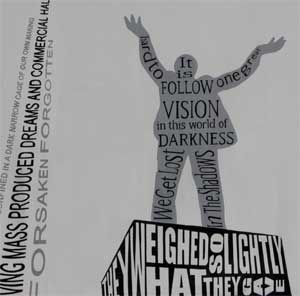 Next year, 2013, will mark the 100th anniversary of what many see as the most significant industrial dispute ever to have taken place in Ireland - the Dublin Lockout. The employers of Dublin, led by William Martin Murphy, locked out over 20,000 workers in an attempt to starve them into submission and to smash the increasingly popular Irish Transport and General Workers Union (ITGWU).
Next year, 2013, will mark the 100th anniversary of what many see as the most significant industrial dispute ever to have taken place in Ireland - the Dublin Lockout. The employers of Dublin, led by William Martin Murphy, locked out over 20,000 workers in an attempt to starve them into submission and to smash the increasingly popular Irish Transport and General Workers Union (ITGWU).
Was Croke Park “the best deal available?” And more importantly why?
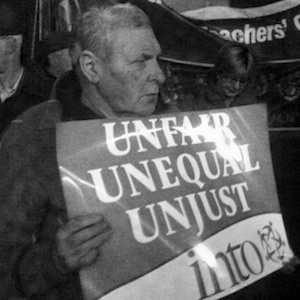 INTO (Irish National Teachers Organisation) general secretary Sheila Nunan and other union leaders have said that the Croke Park extension deal is “the best deal available through negotiation” and that the negotiators “left nothing at the table”. And they are probably right. But saying that this is the best deal available through negotiation is not quite the same as saying that it is the best deal achievable.
INTO (Irish National Teachers Organisation) general secretary Sheila Nunan and other union leaders have said that the Croke Park extension deal is “the best deal available through negotiation” and that the negotiators “left nothing at the table”. And they are probably right. But saying that this is the best deal available through negotiation is not quite the same as saying that it is the best deal achievable.
Education workers to hold rally for No vote to Croke Park 2 in Dublin
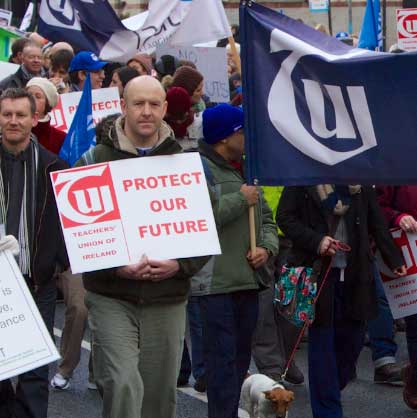 A Rally of education workers to call for a rejection of the Croke Park 'extension' deal will be held in the Gresham Hotel, Dublin, on Saturday next 9th March at 12 noon. The rally is bring organised as a result of an initiative from 5 branches of the Teachers Union of Ireland which called an organising meeting last week. This meeting was attended by over 60 union members, mainly branch and district officers, from the 4 teaching unions (TUI, ASTI, INTO and IFUT) as well as representatives from SIPTU's Education branch and from some other public service union.
A Rally of education workers to call for a rejection of the Croke Park 'extension' deal will be held in the Gresham Hotel, Dublin, on Saturday next 9th March at 12 noon. The rally is bring organised as a result of an initiative from 5 branches of the Teachers Union of Ireland which called an organising meeting last week. This meeting was attended by over 60 union members, mainly branch and district officers, from the 4 teaching unions (TUI, ASTI, INTO and IFUT) as well as representatives from SIPTU's Education branch and from some other public service union.
DUB: Vote “NO” to Croke Park 2. Defend Education. Defend Public Services
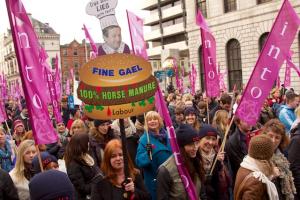 A grass-roots rally of public servants in the education sector will take place in the Gresham Hotel Dublin at 12:00 on this Saturday 9th March 2013.
A grass-roots rally of public servants in the education sector will take place in the Gresham Hotel Dublin at 12:00 on this Saturday 9th March 2013.
The Croke Park extension: What it is and how to fight it.
 Early yesterday morning, the leadership of the public sector committee of ICTU emerged from talks with the government claiming they had achieved the best possible outcome from the negotiations. The best possible outcome in question involves extra hours at work, cuts in overtime rates and allowances for unsociable hours, delayed increments and revisions to flexitime arrangements and work-sharing patterns.
Early yesterday morning, the leadership of the public sector committee of ICTU emerged from talks with the government claiming they had achieved the best possible outcome from the negotiations. The best possible outcome in question involves extra hours at work, cuts in overtime rates and allowances for unsociable hours, delayed increments and revisions to flexitime arrangements and work-sharing patterns.
"We are living under extraordinary circumstances and people are suffering extraordinary miseries.” – Jack O’Connor on Today FM’s The Last Word. There’s more misery to come.
Croke Park talks are a farce - unions have no mandate to enter negotiations
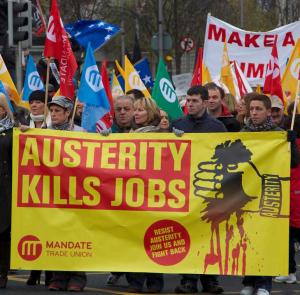 According to RTE (Monday 14th Jan), “The opening negotiations on a new public service agreement have ended after a meeting between management and unions.” It’s tempting to ask whether anyone on either side of the talks has even a basic idea of what the word “negotiations” means. Even in a hostage situation, if the police open “negotiations” with the hostage takers, it’s usually with a tacit understanding that there will have to be some concessions made in order to secure the release of the hostages. In this case however, it’s akin to the police negotiator discussing with the hostage taker whether the hostages are to be killed by gunshot, stabbing or poisoning. The notion that the role of the negotiator is to secure the release of the hostages has been ditched.
According to RTE (Monday 14th Jan), “The opening negotiations on a new public service agreement have ended after a meeting between management and unions.” It’s tempting to ask whether anyone on either side of the talks has even a basic idea of what the word “negotiations” means. Even in a hostage situation, if the police open “negotiations” with the hostage takers, it’s usually with a tacit understanding that there will have to be some concessions made in order to secure the release of the hostages. In this case however, it’s akin to the police negotiator discussing with the hostage taker whether the hostages are to be killed by gunshot, stabbing or poisoning. The notion that the role of the negotiator is to secure the release of the hostages has been ditched.
After Croke Park: what to do now? - facing reality in our unions
In mid-June the Irish Congress of Trade Unions Public Services Committee voted to accept the ‘Croke Park deal’. ‘Social partnership’, presumed dead and buried when the government unilaterally imposed pay cuts on public sector workers in the December ’09 budget, was revived and given a new lease of life. But this is ‘social partnership’ with a difference. Instead of the union leadership believing that ‘partnership’ gives them some input into government policy (as they have wrongly thought for the past 20 years), all they can now offer in its defence is that this is the “least worst deal” and that “it’s better to be inside the tent than outside.”
Results of the PSA / Croke Park Deal ballot
The sequence of tables shows the results of the ballots in the Trade Unions on the 'Croke Park Deal' as of the 24 May. We will be updating these tables as new results become available. The tables show the number of members in each union, what the executive recommended and how the members voted (where this is known).
Teachers, the crisis and the wolves going after Greece
Brian Mooney used his regular column in the 'Education Today' section of the 'Irish Times to tell teachers why should vote yes to the public sector agreement. This is a response to his argument by teacher and WSM member Gregor Kerr submitted as a letter to the irish Times.
CPSU votes to reject Public Sector Agreement
The Civil Public and Services Union (CPSU) has voted to reject the Croke Park deal by over 2 to 1. This is a very significant result as the 13,000 CPSU members are the lowest paid public sector workers in the country, the grades that might have benefited from the supposed role back of the pay cut is savings were delivered.
The result of the CPSU ballot on the Croke Park Draft Agreement was as follows

